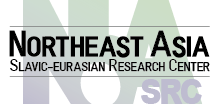The UBRJ/NIHU Seminar titled ‘Borderland People’ took place at Slavic-Eurasian Research Center, Hokkaido University on February 22, 2018. The idea was to bring into focus ethnic minorities living in the borderland areas by discussing their sense of belonging – ethnic and/or national – through their lived experiences, perceptions and coping strategies. The seminar consisted of two presentations, namely ‘The limits of Koreanness: Korean Encounters at a three-way border’ by Dr Ed Pulford (JSPS postdoctoral fellow, Hokkaido University) and ‘Between nationalization and transnationalization: the politics of belonging among Dungans in post-Soviet Kazakhstan’ by Assel Bitabarova (PhD student of Graduate School of Letters, Hokkaido University).
Based on extensive ethnographic fieldwork, Dr Pulford’s presentation examined the fluid ideas about ‘Koreanness’ which emerge in encounters between Russian-speaking Koryŏ saram (Koreans from the former-USSR) and Chosŏnjok (PRC citizens of Korean ethnicity) in Hunchun, a Chinese border city located at the junction of Chinese, Russian and North Korean borders. The second presentation focused on Kazakhstani Dungans, Chinese-speaking Muslims, who are now officially recognized as a Chinese diaspora by both states: Kazakhstan and China. It discussed how Dungans in post-Soviet Kazakshtan formulate and reformulate their identities and homeland loyalties, which are significantly influenced by the following two processes: nationalization – a nationalizing domestic environment in their host state (Kazakhstan) – and transnationalization – their evolving engagement with historic homeland (China).
Although the two presentations differed from each other in a number of ways – ranging from focusing on two distinct spatial locations to applying different methodological approaches, they shared some similarities. Probably most notably, both case studies showed that changing social, political, and economic conditions after the collapse of the Soviet Union have had a strong influence on how the ethnic minority groups (the Koryŏ saram and Dungans) negotiate their identities and sense of belonging. Moreover, as Dr KIKUTA Haruka pointed out in a discussion following the presentations, both studies suggested the significance of transnational connections and processes in fostering these identities. Dr Kikuta also provided insightful comments and valuable suggestions, along with some probing questions. Of particular importance to the speakers were her comments on the use of the theoretical framework and key concepts. Dr Kikuta’s detailed questions, for instance, about South Korea’s migration policy towards overseas Koreans or the language education of Kazakhstani Dungans, led to a lively discussion between the speakers and attendees.
Bitabarova Assel (PhD student, Graduate School of Letters, Hokkaido University)

 Eurasia Unit for Border Research (Japan)
Eurasia Unit for Border Research (Japan)




